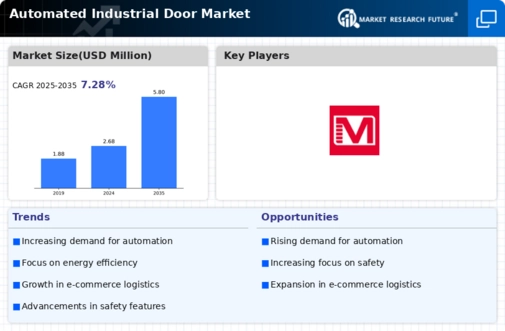Top Industry Leaders in the Automated Industrial Door Market

Automated Industrial Door Market: An In-Depth Exploration of Competition, Strategies, and Trends
The automated industrial door market is currently witnessing robust growth, driven by advancements in automation, the implementation of safety regulations, and increasing demands for energy efficiency. In this dynamic landscape, a multitude of players are actively competing for market share, deploying diverse strategies and capitalizing on emerging trends. This analysis delves into the competitive scenario, scrutinizing strategies employed by key players, factors influencing market share, and the evolving trends that will shape the future of the industry.
Key Player Strategies:
Major global players such as ASSA ABLOY and Boon Edam are leveraging their expansive product portfolios, well-established distribution networks, and brand recognition to cater to diverse customer segments. Their focus revolves around acquisitions and partnerships to extend their reach and enhance their technology offerings.
On the regional front, players like Hörmann and Marantec engage in intense price competition and customization, targeting niche markets and specific application areas. Significant investments in research and development are made to craft innovative door designs and materials tailored to specialized industrial environments.
Emerging players, particularly in Asia, are adopting aggressive pricing strategies and cost-effective manufacturing methods to gain traction. They specifically cater to budget-conscious buyers and provide value-added services such as installation and maintenance support.
Factors for Market Share Analysis:
-
Product Portfolio Breadth and Depth: Offering a diverse range of door types (sectional, rolling, high-speed), materials (steel, aluminum, insulated), and automation systems (radar, sensors) caters to varied industrial needs and strengthens market share. -
Technological Advancements: The integration of smart sensors, IoT connectivity, and predictive maintenance features into doors enhances operational efficiency and provides data-driven insights, attracting tech-savvy customers. -
Geographical Reach and Distribution Network: Extensive sales and service networks across key regions ensure immediate customer support and product availability, solidifying market presence. -
Sustainability Focus: The development of energy-efficient doors with improved insulation and rapid opening/closing speeds aligns with environmental regulations, appealing to eco-conscious buyers. -
Post-Sales Service and Maintenance: Prompt and reliable after-sales support builds customer loyalty, encouraging repeat business and securing market share through long-term relationships.
New and Emerging Trends:
-
Smart Door Technologies: The integration of industrial doors with building management systems, access control, and AI-powered safety features is transforming them into intelligent access points, enhancing security and operational efficiency.
-
Material Innovations: Lightweight, high-strength composite materials are gaining traction for their durability, corrosion resistance, and improved thermal insulation, catering to specific industrial applications.
-
Focus on Safety and Compliance: Stringent safety regulations are driving demand for doors with advanced safety features like collision sensors, emergency stop functions, and improved visibility panels.
-
Sustainability Initiatives: Manufacturers are increasingly focusing on eco-friendly materials, energy-efficient designs, and a reduced carbon footprint throughout the production and operational life cycle, aligning with environmental goals.
-
Data-Driven Services: Predictive maintenance solutions based on sensor data and cloud analytics are emerging, enabling proactive maintenance and minimizing downtime for industrial operations.
Overall Competitive Scenario:
The automated industrial door market is marked by intense competition, with established players facing challenges from regional and emerging competitors. Differentiation through innovative technology, niche expertise, and customer-centric service offerings is crucial for success. The industry's focus on sustainability, smart features, and data-driven services will shape the future, demanding continuous innovation and adaptation from market players. Understanding key strategies, market share factors, and emerging trends is essential for any company aiming to thrive in this dynamic and promising market.
Industry Developments and Latest Updates:
-
Assa Abloy AB (Sweden):
- Date: December 21, 2023
- Development: Acquired Albany Engineered Composites, a US-based manufacturer of high-performance composite doors for demanding industrial applications, expanding Assa Abloy's offerings in the heavy-duty door segment.
-
Hart Door Systems (U.K):
- Date: December 15, 2023
- Development: Launched the new HDR Rapid Roll door, designed for high-speed opening and closing cycles in demanding environments, offering improved thermal insulation and weather resistance.
-
AI-Barrack Industrial Group (Saudi Arabia):
- Date: December 18, 2023
- Development: Secured a major contract to supply and install high-security industrial doors for a new power plant project in Saudi Arabia, showcasing AI-Barrack's expertise in the critical infrastructure sector.
-
Maviflex (France):
- Date: December 12, 2023
- Development: Unveiled a new range of fire-resistant industrial doors, complying with the latest European safety standards, strengthening Maviflex's position in the fire protection market.
Top Companies in the Automated Industrial Door Industry:
- Assa Abloy AB (Sweden)
- Hart Door Systems (U.K)
- Gandhi Automations Pvt Ltd. (India)
- AI-Barrack Industrial Group (Saudi Arabia)
- Maviflex (France)
- RTJ Automation & Maintenance Limited (U.K)
- The Agta Record Group (Switzerland)
- Gilgen Door Systems AG (Switzerland)
- Novoferm GmbH (Germany)
- CASIT S.N.C. di CC Ramella & C. (Italy), and others.










